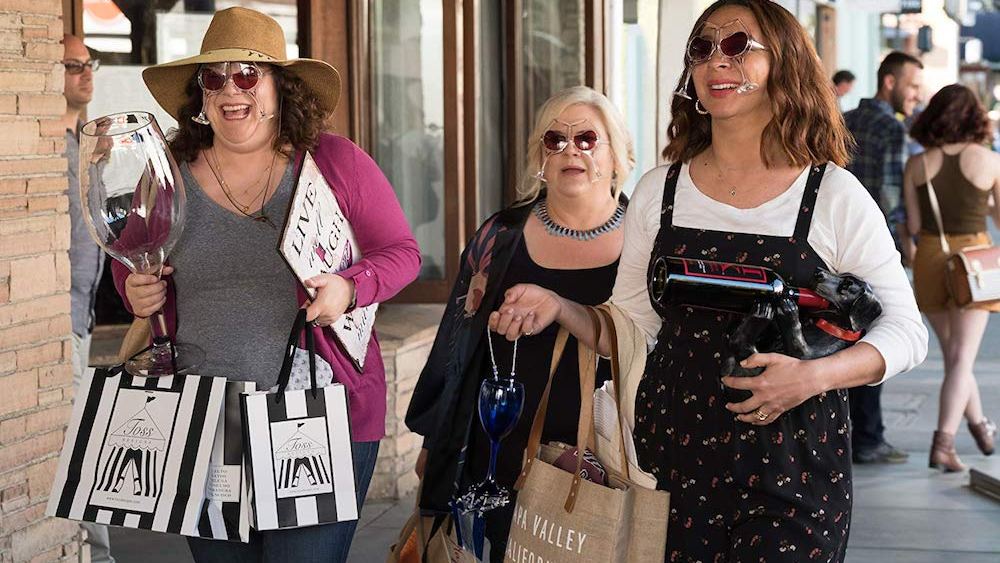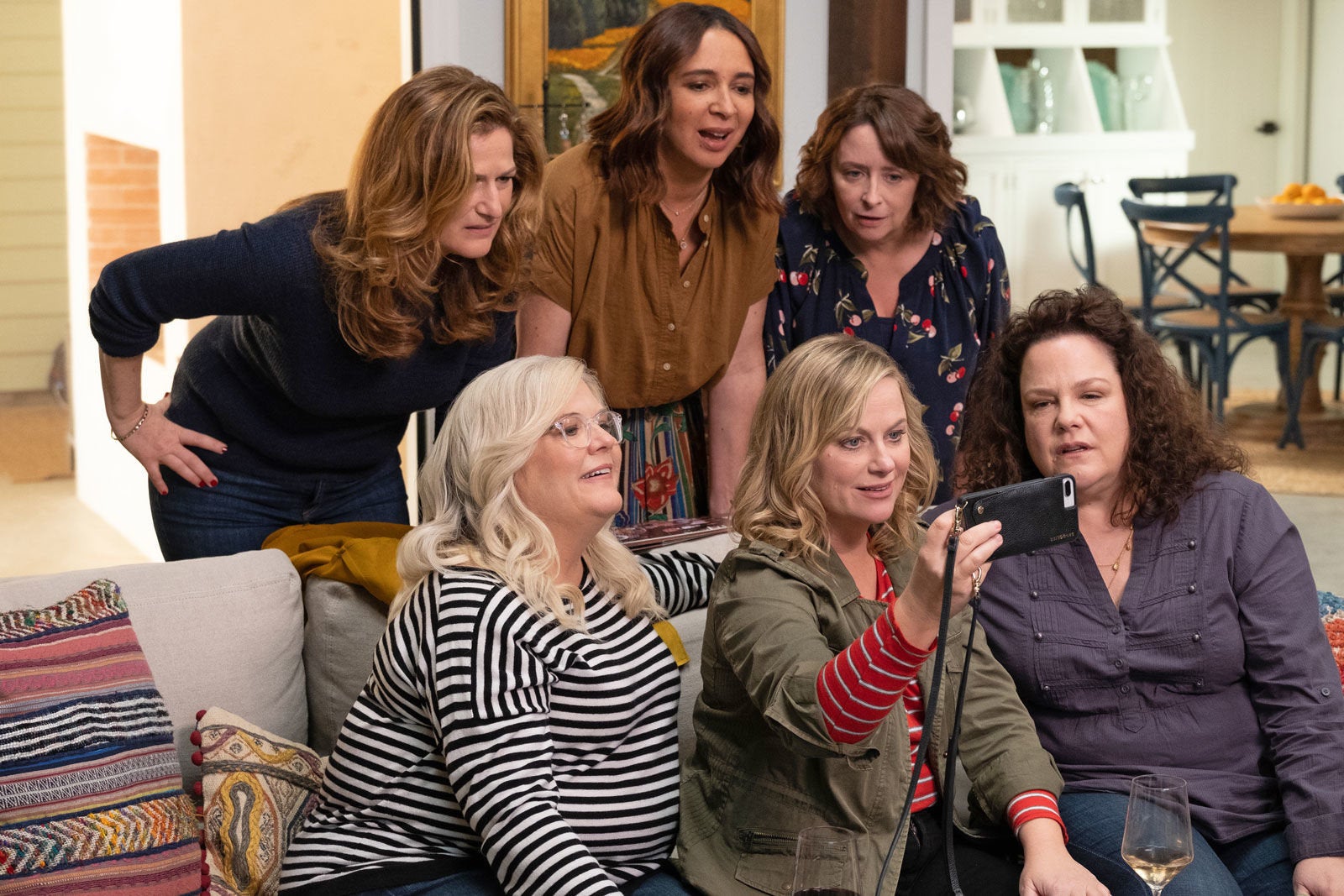As Amy Poehler’s Wine Country arrives on Netflix – why do the arts consistently fail older women?
In our weekly column, Fiona Sturges despairs at an entertainment industry where women are ‘washed up’ by the time they hit middle age


Your support helps us to tell the story
This election is still a dead heat, according to most polls. In a fight with such wafer-thin margins, we need reporters on the ground talking to the people Trump and Harris are courting. Your support allows us to keep sending journalists to the story.
The Independent is trusted by 27 million Americans from across the entire political spectrum every month. Unlike many other quality news outlets, we choose not to lock you out of our reporting and analysis with paywalls. But quality journalism must still be paid for.
Help us keep bring these critical stories to light. Your support makes all the difference.
In Wine Country, the new Netflix film co-written and directed by Amy Poehler, six girlfriends go on a trip to Napa in order celebrate one of their number – a psychoanalyst named Rebecca – turning 50. Rebecca insists her birthday is no big deal. “You’re only as old as you feel, right?” she says. “Why stress about it?”
Except that she’s deeply stressed – they all are. These middle-aged women self-medicate with wine and prescription pills, and pass merciless judgment on one another while privately wallowing in disappointment and regret. If they were Snow White’s dwarfs, they would be called Bossy, Needy, Lonely, Creaky, Frightened and Overworked. Let the record show that there is no Happy. Similarly aggravating is their disdain for the younger generation, whom they loudly dismiss as entitled and over-sensitive. Wine Country stands both as a narrow and mean-spirited portrait of older women and a dispiriting reflection of how they are represented in popular culture.

We live in an age in which all of us can expect to live and work longer and yet, in the eyes of the entertainment industry, women are washed up by the time they hit middle age. If they’re not forcibly retired from our screens at 40, then the storylines in which they are placed see them dwelling on myriad disappointments, or transformed into “gorgons and dragons”, as Meryl Streep once put it, or that time-honoured classic: the crazy cat lady. These archetypes reside in everything from Disney’s evil stepmothers to The Simpsons’ Eleanor Abernathy and the sentimental midlife depictions in the likes of Calendar Girls and Shirley Valentine. There are, of course, some notable exceptions – series such as Nurse Jackie, Happy Valley, Better Things and Mum (which returns to BBC2 next week). These have broadly steered clear of the usual cliches – though such nuanced portraits are few and far between.
More ruthless still is the pop industry in which women have a habit of disappearing in a puff of smoke at roughly the same time as their fertility falls off a cliff. Should they have the temerity to stick around, they are invariably humiliated for it. See Madonna, who is shortly to release her 14th album and is waging war on the scores of detractors – among them that heroic guardian of female decency, Piers Morgan – who reckon she’s too old to be doing the job she has done for the past 35 years. “People have always been trying to silence me for one reason or another, whether it’s that I’m not pretty enough, I don’t sing well enough, I’m not talented enough, I’m not married enough, and now it’s that I’m not young enough,” she told Vogue. “Now I’m being punished for turning 60.”
In her book, How to Be a Woman, Caitlin Moran reveals the series of questions she asks herself in order to judge whether “some sexist bullshit is afoot”. The questions run thus: “Are the men doing it? Are the men worrying about this as well? Is this taking up the men’s time? Are the men told not to do this, as it’s ‘letting the side down’?”
For male actors and musicians, the answer is nearly always: no. With their stately silver hair and characterful wrinkles, they are able to continue their careers unimpeded; the longer they keep working, the more respect they are given. Next month, Nick Cave, a man in his sixties who dyes his hair and wears shirts split to the navel, brings his Conversations tour to Britain. His career has spanned four decades and seen him go from heroin-addled punk outsider, to screenwriter and novelist, to arena-filling rocker and all-knowing sage. To be clear, Cave is excellent and deserves all the praise that is heaped up on him. It’s also worth noting that no one is suggesting that he retire.
In a 2016 sketch by the US comic Amy Schumer, the myth of a woman’s sell-by date is brilliantly skewered. In it we see Schumer stumbling on a picnic in which three actors – Julia Dreyfus, Tina Fey and Patricia Arquette – celebrate the last day of being “believably f**kable” in the eyes of their industry. “If you shoot a sex scene the night before your birthday, everyone’s, like, ‘Hurry up, hurry up, we’ve got to get it before midnight’ because they think your vagina’s going to turn into a hermit crab,” says Fey.
That women are often faded out in midlife has nothing do with ability and everything to do with sex and the male gaze. No longer an object of desire, they suddenly become meek, mean, sad or embarrassing – never mind the talent, accrued wisdom and brilliant stories they may offer. It’s particularly disappointing given the influence that film, music and TV exerts on how we collectively think and feel. Popular culture is failing women who are still in the prime of their lives. It’s time to put this right.
Join our commenting forum
Join thought-provoking conversations, follow other Independent readers and see their replies
Comments